Mars date: 22 Oct 2019
T-Minus 14 hours. As Mission Director I was relaxing in my hotel resting before the early morning launch of MarsLander. Sitting at a table in the restaurant next to me were 6 Japanese cabin crew. I assumed from a national airline as I do not remember hiring them as part of the MarsLander flight!
They were animated in their discussions. Detached from their surroundings. I could not understand a word. It made me realize I also do not understand my own Mission control IT team. They too have their own language and appear detached from the business surroundings….
I looked at the brochure of the conference I had been invited to speak at. The theme of the Service Management Forum Schweiz was ‘SERVICE MANAGEMENT – KEY TO THE STRATEGIC BUSINESS PARTNERSHIP’. I was hoping that somehow ‘Service Management’ would be the language which would bind us together in the MarsLander mission. A language and set of capabilities which would unite us in a strategic business partnership.
Judging from my experiences in recent missions I was thinking that it might be easier to learn Japanese than learn to communicate with these ITSM people!
T-Minus 2 hours till launch. The next day started early with pre-flight checks in the ‘Bombay room’. From Japan to Bombay! It was turning into an international experience here in Zurich. There were some last minute issues and customer requirements that would need to be engineered after the launch.
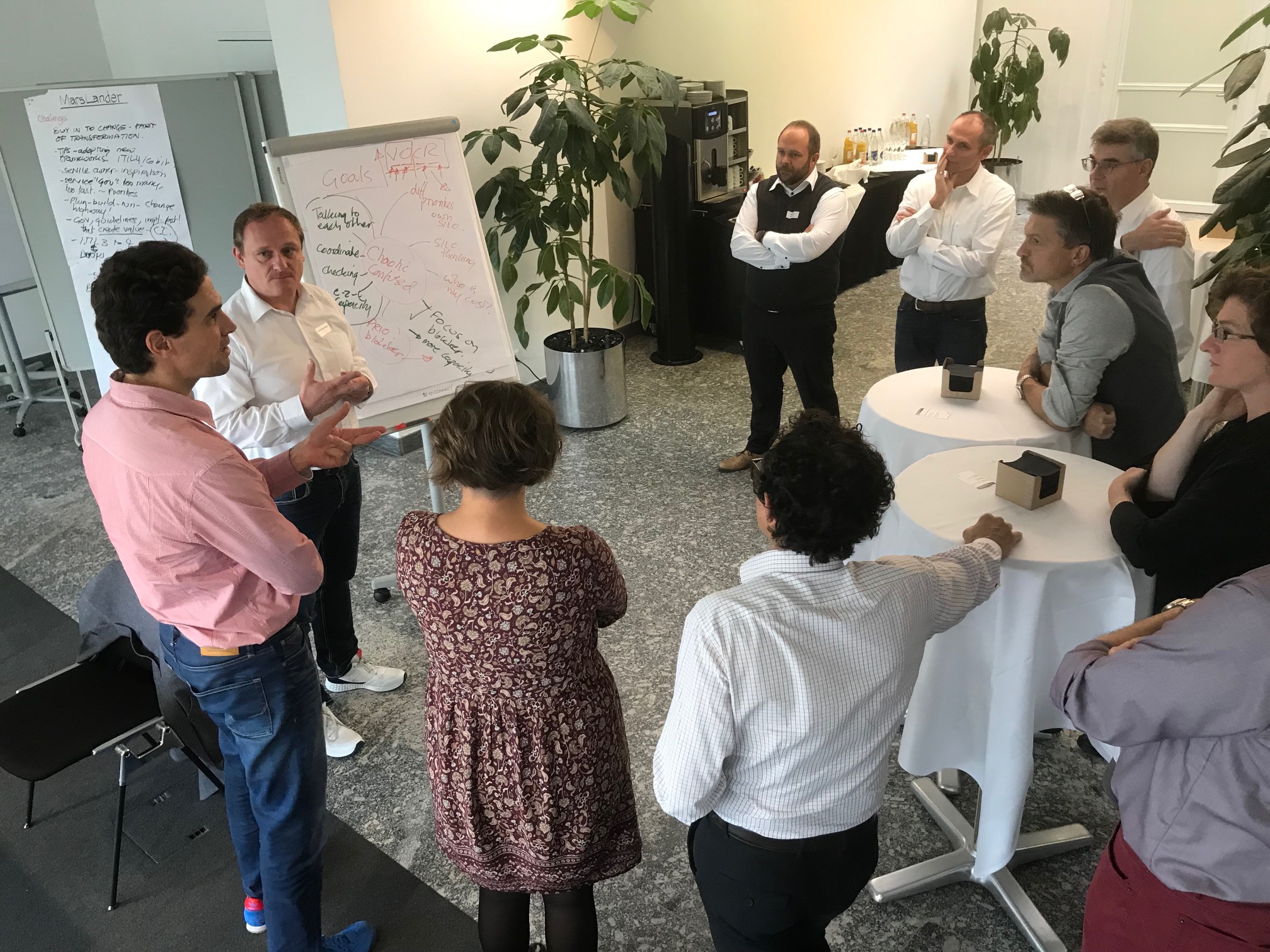
T-Minus 1 hour. I gave my final Mission briefing explaining the goals and announcing a new critical service offering we are launching with this mission. I explained our vision and how we need to differentiate ourselves from the competition. ‘Agility’ is the name of the game and fulfilling ever changing customer expectations. The team was made up of specialists who understood ‘Agile’, ‘DevOps’, ‘ITIL4’, ‘COBIT’ – all of these ‘frameworks’ professing to claim end-to-end agile capabilities. I was expecting great things and proud of my team. The sales director and customer support, working with the product owner and application development would ensure new customer demands and opportunities would be fulfilled. Flight operations working closely with the service desk, systems engineer and the vendor would ensure availability and service continuity. Change & Release would ensure smooth deployment of changes and service management would……..I am still not sure what value they give me. They kept talking about Service Level Agreements and Service Catalogues when I asked them about value!
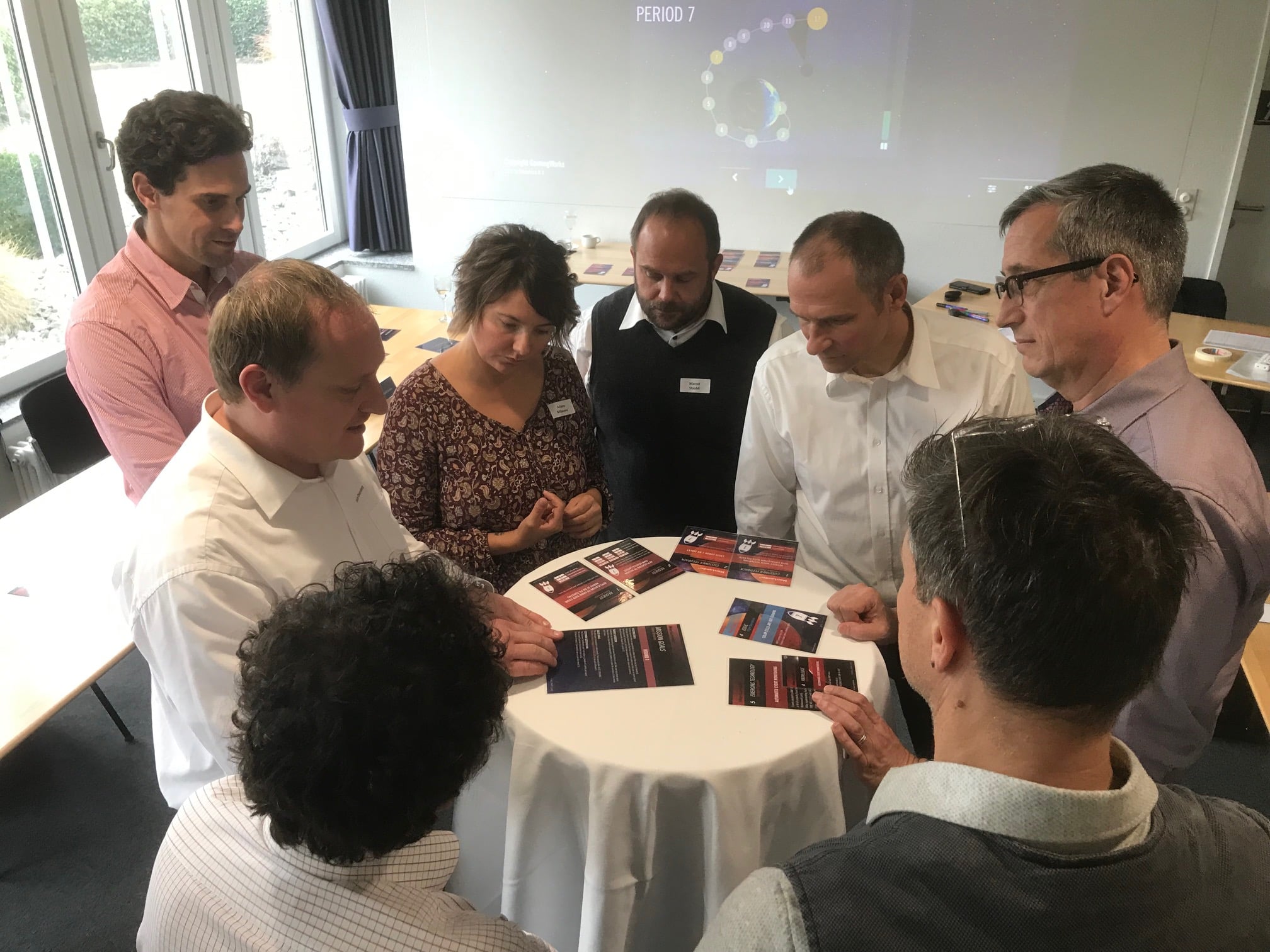
T+1. The launch went smoothly. However, so much for all of these ‘Agile’, ‘DevOps’, ‘ITIL’, ‘COBIT’ end-to-end capabilities. I saw SILO’s, lack of end-to-end communication and collaboration, nobody seemed to think I existed as Mission Director, every answer I got was one that people thought I wanted to hear, there was no transparency. Everybody was talking about technology, applications, servers, events, issues, release schedule……I didn’t hear the words ‘business value’ or ‘business goals’ once.
The service manager proudly declared that the SLA was achieved. ‘Good’ I said ‘Can you now explain the relation between the SLA and the fact that CSAT, image, reputation and revenue targets were not achieved’?……and does anybody know what the key goals were’?
<BEEP> was the only answer I heard as another mission event popped up on the monitoring system, informing me that a critical business goal had not been realized because of IT.
I asked my business team if they had effective IT Governance. ‘IT promised us we would get our features and customer feedback’ was their answer.
‘…And did we’? I asked.
‘…er…’
‘And what about the risks we face with all of these events and issues. How are we dealing with risk’? I asked.
‘…er…’
‘And what about the conflicting demands on resources from all of the different types of demands and opportunities, do we have a business focused priority mechanism’?
‘…er…’
‘So much for the ‘co-creation’ of value’! I exclaimed as Mission Director, pointing to the definition of a service according to ITIL4. ‘…a means of enabling value co-creation by facilitating outcomes that customers want to achieve, without the customer having to manage specific costs and risks.’
It made me think of the book ‘Men are from Mars, women are from Venus’. It seems like ITSM people are from Mars and the business is from Venus. And judging by the skills shown so far we won’t reach either Mars or Venus on this mission!
……..End of Mission log entry.
Reality check
The MarsLander workshop team at the SMFS event had felt and heard the frustration of a business executive relying on ‘digital capabilities’ to survive and differentiate themselves in this world of fast paced change. End-to-end IT capabilities are becoming increasingly important, traditional organizational SILO’s and frameworks need to give way to end-to-end value streams. ITIL4 is the latest addition to the world of practices aimed at improving ‘flow’ and ‘value streams’.
Delegates attended the MarsLander simulation to discover more about these challenges, how ITIL4 can play a role and also what this will mean to ‘service management’ skills and behaviors.
Challenges facing ITSM
Delegates were asked ‘What challenges are you facing and what are you hoping to discover today’?
Challenges:
- ‘…How to get buy-in to change management (ITIL) as part of our business transformation, there are differences of opinions and arguments between Dev and Ops’.
- ‘…Looking for tips on adopting new frameworks ‘ITIL4’, ‘COBIT’. In and Agile world. ITIL is seen as no longer relevant’.
- ‘…As a Service owner I am looking for inspiration. Where does the Service owner fit in with Product owners?
- ‘…I want to explore how we can create Service ‘Governance’ – we have too many changes, too fast and all with the highest priority’.
- ‘..We need Shift from a Plan-Build-Run SILO focus to a ‘change highway’. How will ITIL4 help’?
- ‘….Governance guidelines, how to implement fast, but safely, practices that deliver sustainable value and are embedded in a culture of continual change’.
- ‘…Making the shift from ITIL3 to ITIL4 in a way that demonstrates the value of doing so, and the relevance of ITIL’.
- ‘….Showing the relevance of Service management. Business governance does NOT EQUAL an SLA’.
- ‘….Smoothly ‘Implement’ an ITSM/ITIL4 project’! – (We need to break away from the ‘project implementation’ to ‘continual improvement as a culture’ – owned by everybody).
MarsLander Launch – ‘From theory to painful practice’
The first game round following the launch was characterized by confusion and frustration. Lack of situational awareness, lack of effective prioritization of resources, unclear goals, poor collaboration, disruptions, wasted effort, mistakes, value was not realized. There was a painful recognition of similarities with their daily challenges.
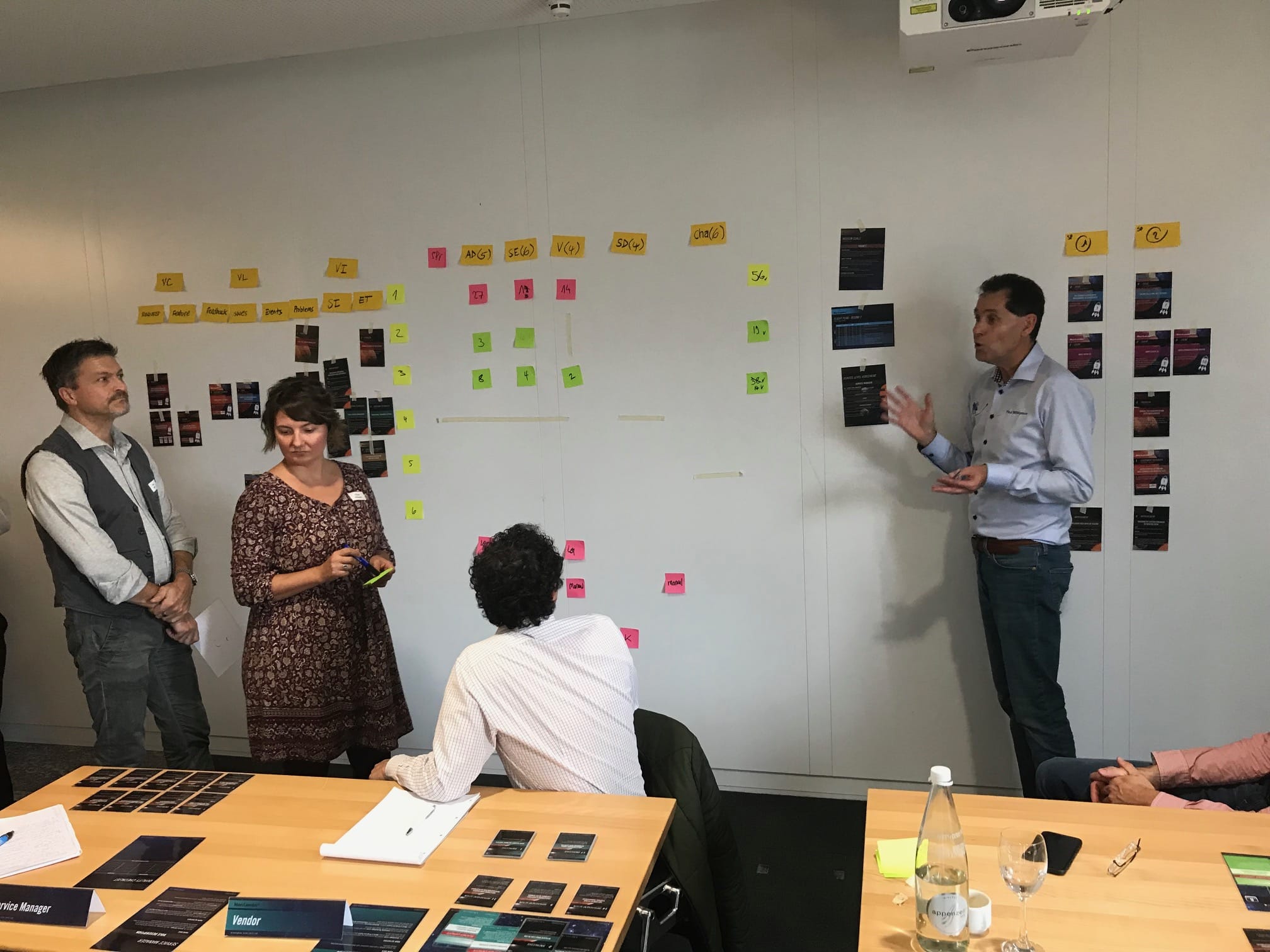
We then explored ITIL4 concepts particularly the ‘Guiding principles’ and the SVS (Service Value System). The team ‘progressed iteratively with feedback’ (A core guiding principle) between game rounds, each time with a ‘Focus on value’. Using the definition of a service to continually align priorities against ‘value’, ‘outcomes’,’costs’ and ‘risks’.
From ‘practice’ to results
At the end of the simulation the team had turned round the performance. Value was being realized, more work was passing through the value streams. I as Mission Director was happy and the team ‘trusted’ each other. They were collaborating as an end-to-end team, all focused on co-creating value. How come? What did we do? More importantly ‘what do we need to takeaway, so that we can address the challenges we are facing’?
First steps on the road to continual improvement
These were the key takeaways that delegates wanted to apply back in their own organizations:
- ‘..Work with our Project organization to understand the full backlog of types of demands as well as the planning expectations (understand the portfolio planning), and the value expectations’.
- ‘…Each department brings value and is necessary in co-creating value, ensure that each department understands how they fit in to the ‘value’ chain’.
- ‘..Governance is crucial and something we are getting wrong. It is also something that is not given enough attention in ITIL. We must engage with the business to get the board on-board with facts & figures and demonstrate we understand their drivers’?
- ‘…The importance of collaboration (sustainable behaviors) and transparency. The need to build a visual management capability together to address recognized issues (situational awareness, prioritization of resources, fast decision making, identifying constraints, barriers and improvement needs, understanding the e-2-e value stream).
- ‘…The importance of ‘co-creation’ and end-to-end ‘Focus on value’. Translate these into ‘desirable behaviors’’.
- ‘…Visibility is crucial – visualization of the SVS (Service value system). Start with gaining visibility into the backlog of demands and the relationship to business value, and how the value chain fits together’.
- ‘….The importance of team collaboration – turning this into agreed, sustainable behaviors, feedback and continual learning and improvement’.
- ‘…The importance of understanding and managing value streams. (That value comes out and waste is removed). Select and map out some pilot streams together with the value chain stakeholders’.
- ‘…Apply the Value formula thinking: Value = Value creation(VC) – Value leakage (VL) + results of Value improvements(VI)’.
- ‘…..‘Engage’ end-to-end stakeholders in improving THEIR own work. As a service manager don’t own it!
It was an ‘eye-opening’ experience said one delegate, adding ‘we came in as ITIL Experts and now realize a different level of expertise is needed’.
‘This requires a significant mindset and behavior shift from Service managers to ‘co-create’ value’.
‘That one word ‘co-create’ signifies a massive difference in the way we engage, communicate and collaborate’.
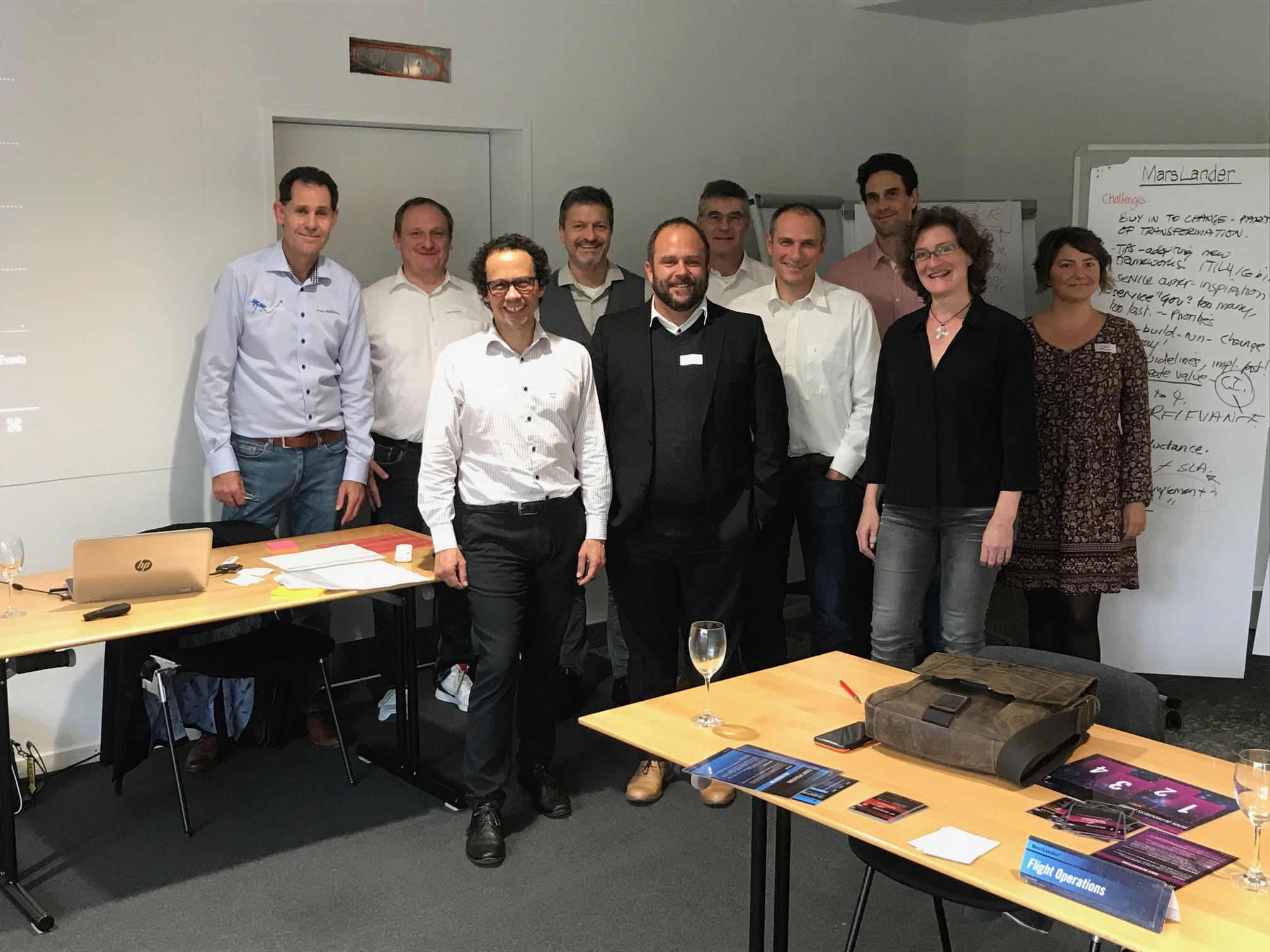
Final words
Mission Director Log: ITSM the next generation?
Mars date: 22 Oct 2019
Finally the team started talking the same language. It wasn’t the language of ‘service management’, it was the language of business value! Strategic partnership is within reach, but it requires new leadership skills, patience, coaching and a focus on business and IT behavior change. ‘Co-creation’ requires a solid relationship built on trust.

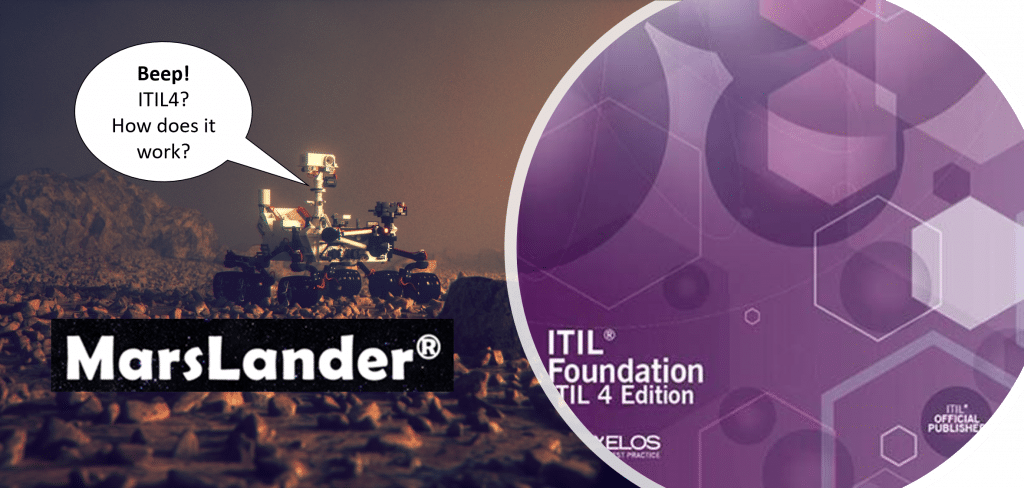
Thank you very much, love the analogy. I can see how I can use this in my own environment.
Thank you Derrick, please let me know if you try and apply any of the takeaways the team discovered. It is always very rewarding to see how people take away and translate the theory into practice.
What a great experience – also for me as an outside observer of the simulation you gave at the SMFS 2019!
Key take away again: Visibility is key! It s amazing how much more clarity on the activities and focus on the important goals (customer value, satisfaction …) can be achieved by use of this simple tool.
Thank you also for the many valuable inputs, I will take them with me in my next ML Simulations.
Thank you Adrian, yes this is a global takeaway from MarsLander simulations. The importance of the ITIL4 Guiding principle ‘collaborate and promote visibility’ – visibility as you say is key to enable effective decisions making, prioritize work, identify constrains and improvements, particularly when this is done collaboratively with stakeholders from the end-to-end value steams. ITIL Service management practitioners have an important role in helping facilitate and enable this. All best with your future MarsLander missions!
In this lively session I’ve got a new view on what value really means and I believe this went 100% into the direction of the main focus in ITIL 4.
Rene thanks for the feedback. I am pleased the session gave you some new insights into ‘value’ and also the need for end-to-end value streams. Indeed as you say this is the focus on ITIL4, however it means significant mindset, behavior skills shift for ITIL experts and ITIL practitioners. Translating theory into practice won’t be easy! All the best.